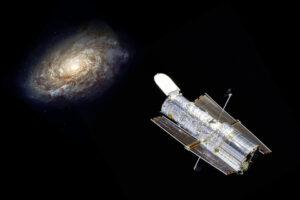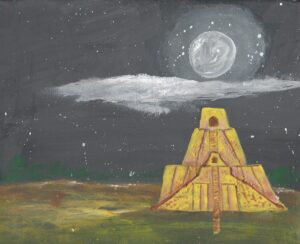One mystery solved
Until the 1920s, cosmologists wondered if the universe was collapsing, expanding, or static. Then came the answer, it was expanding. The mystery was solved. It became clear that the universe had a beginning and a single point of origin. This finding resulted in a theory called the “big bang.” The “big bang” theory gained traction but added questions that could not be explained. The biggest mystery was: from where did all the energy and mass come?
More confusion than answers
Then, in 1998, cosmologists found that not only was the universe expanding, but it was doing so at an accelerated rate. This discovery forever changed cosmology. The terms dark energy and dark mass were coined in an attempt to explain accelerated expansion. Remarkably, cosmologists estimate that 95 percent of our universe is either dark energy or dark matter. Cosmologists don’t know what the “dark stuff” is, how it works, where it came from, or even if it exists. Modern cosmology is confused.
doing so at an accelerated rate. This discovery forever changed cosmology. The terms dark energy and dark mass were coined in an attempt to explain accelerated expansion. Remarkably, cosmologists estimate that 95 percent of our universe is either dark energy or dark matter. Cosmologists don’t know what the “dark stuff” is, how it works, where it came from, or even if it exists. Modern cosmology is confused.
The first law of cosmology
Because of the confusion, there are no laws of cosmology that have gained consensus. Therefore, we propose the following law of cosmology, the first law of cosmology:
Our Universe is a temporal
happening in an eternal system
Cosmology is the scientific study of the origin and development of the universe. This proposed law encapsulates all scientific evidence and common sense concerning the universe’s origin and resulting development.
Chasing eternity
After having dealt with the big bang problems, many scientists are proposing origin models which consider infinite universes, bubbles in nothingness, previous big bangs, etc. All these mechanisms, when traced back and back and back, end with the concept of eternal. We know our universe exists, and if we continue to chase its origin back and back and back, we have no choice other than to accept an eternal system.
Benefits of the first law of cosmology
Our proposed law of cosmology allows scientists to put aside questions that are impossible to answer. For instance, (1) how to get something from nothing and (2) why is there anything at all. Attempting to answer these questions without eternal concepts may be fun but does not advance science. There are so many pertinent questions to examine that can benefit society such as (1) How much energy is in a quantum vacuum? (2) What is the mechanism for gravity, (3) How to connect cosmology with quantum mechanics, and (4) How to examine dark matter and energy?
Philosophical comment:
When the big bang hypothesis was being introduced, there were those saying it would give credibility to the Bible. And it is true it does give credibility to the Bible. And it is true that our proposed law gives additional trustworthiness to the Bible. But why would anyone not want to credit the Bible when credit is due? The Bible has a great record of accuracy in all the sciences. Since the Bible has such a good record of being the fundamental book of science, why not use it? Galileo did. Newton did. Faraday did. Max Planck did. Gauss did. Euler did. Linnæus did, and many, many others did. The Bible did not hamper their great scientists and mathematicians. It inspired them.
Biblical Cosmology
 The Bible has always stated that our earth and universe are temporal creations in an eternal system. This notion is now being reluctantly accepted by many scientists. However, those scientists that are atheistic ask the question: Who created the Creator? Good question. From where did God come? The world has a history of many gods, Sumerian gods, Greek gods, Roman gods, Hindu gods, etc. Humans created all these gods. The present writer comfortably states that all human-created gods are false gods, created by our imaginations and needs. They only exist in our minds. However, there is one God, the God of the Bible, who clearly states He had no beginning and no end, and that He is eternal. What a proclamation! To be a true God, one must be eternal, omniscient, and omnipotent. Otherwise, there necessarily is someone higher, older, or smarter.
The Bible has always stated that our earth and universe are temporal creations in an eternal system. This notion is now being reluctantly accepted by many scientists. However, those scientists that are atheistic ask the question: Who created the Creator? Good question. From where did God come? The world has a history of many gods, Sumerian gods, Greek gods, Roman gods, Hindu gods, etc. Humans created all these gods. The present writer comfortably states that all human-created gods are false gods, created by our imaginations and needs. They only exist in our minds. However, there is one God, the God of the Bible, who clearly states He had no beginning and no end, and that He is eternal. What a proclamation! To be a true God, one must be eternal, omniscient, and omnipotent. Otherwise, there necessarily is someone higher, older, or smarter.
The concept of eternal is very difficult to grasp. We, humans, see birds die, trees wither, our ancestors pass away, and fire burns living things into ashes. Babies are born, mighty oaks sprout from seed, and wildflowers bloom in the spring. We are immersed in beginnings and ends. It is difficult for us to comprehend things without a beginning or end.
Here is the logic to understand things eternal. Let’s start with our Creator God of the Bible; from where did He come? Did He come from an older god? If so, from where did the older god come? An older god? He had to come from somewhere. And the older, older god, from where did he come? If you follow this logic, you chase gods until you find eternity and a single God. Since the Bible is the only credible book that discusses eternal matters, why not consider it? There are no other possibilities; all the evidence points to an eternal system.
Summary
It is time for modern cosmologists to acknowledge that we live in a temporal universe in an eternal system. We propose this as the first law of cosmology; reflects all scientific evidence and common sense. It is also in tune with the Bible.
Additional Reading:
If you would like to subscribe, please CLICK HERE
For more of our papers, please CLICK HERE
If you would like to contact us, please CLICK HERE
To access our sister site, Science and the Bible, CLICK HERE
